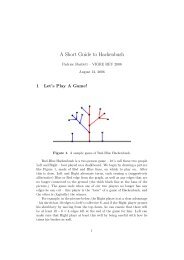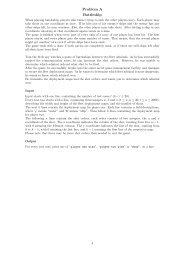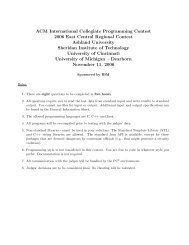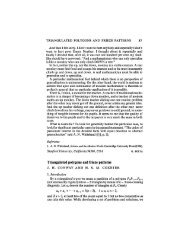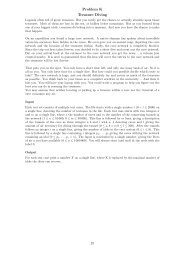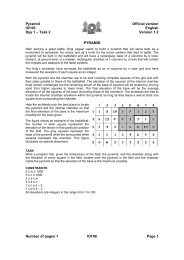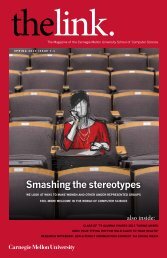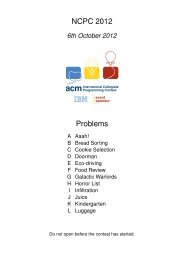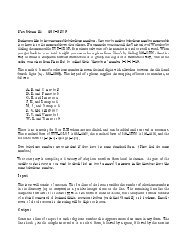Review1 of Liber De Ludo Aleae (Book on Games of Chance) by ...
Review1 of Liber De Ludo Aleae (Book on Games of Chance) by ...
Review1 of Liber De Ludo Aleae (Book on Games of Chance) by ...
Create successful ePaper yourself
Turn your PDF publications into a flip-book with our unique Google optimized e-Paper software.
The above sequence <str<strong>on</strong>g>of</str<strong>on</strong>g> expected values c<strong>on</strong>forms to Pascal’s rule.<br />
To illustrate, Pascal c<strong>on</strong>siders a game in which a player has obtained 1 point and needs 4 more. He notes<br />
that at most 8 plays would be required to complete the game (either player A throws 4 more points, or<br />
player B will throw the required 5). He observes that 1/2 <str<strong>on</strong>g>of</str<strong>on</strong>g> the number <str<strong>on</strong>g>of</str<strong>on</strong>g> combinati<strong>on</strong>s <str<strong>on</strong>g>of</str<strong>on</strong>g> 4 from 8,<br />
divided <strong>by</strong> a sum c<strong>on</strong>sisting <str<strong>on</strong>g>of</str<strong>on</strong>g> this same value, plus the combinati<strong>on</strong>s <str<strong>on</strong>g>of</str<strong>on</strong>g> 5,6,7 and 8 from 8, gives the<br />
same proporti<strong>on</strong> as 1/2 . 3/4 . 5/6 . 7/8 = 35/128.<br />
This is the case, since in general:<br />
1/2 . 3/4 . 5/6 . … . (2n-1)/(2n) = (2n-1)!/n!(n-1)! . 1/2 2n-1 , with:<br />
(2n-1)!/n!(n-1)! = 1/2 . (2n!/n!n!), and<br />
2 2n-1 = 1/2 . (1+1) 2n , and<br />
1/<br />
2 ⋅ ( 1+<br />
1)<br />
2n<br />
= 1/<br />
2 ⋅<br />
2n<br />
∑<br />
i=<br />
0<br />
⎛2n<br />
⎞<br />
⎜ ⎟<br />
⎝i<br />
⎠<br />
In the July 29 th letter, Pascal also provides two tables indicating a divisi<strong>on</strong> <str<strong>on</strong>g>of</str<strong>on</strong>g> wagers for games <str<strong>on</strong>g>of</str<strong>on</strong>g> dice<br />
suspended at different stages. The tables are not accompanied with detailed explanati<strong>on</strong>s. Pascal also<br />
relates the observati<strong>on</strong>s, and questi<strong>on</strong>s <str<strong>on</strong>g>of</str<strong>on</strong>g> M<strong>on</strong>sieur de Mere, relating to a game <str<strong>on</strong>g>of</str<strong>on</strong>g> dice requiring (at least)<br />
<strong>on</strong>e six to turn up in 4 throws. The odds given in favour <str<strong>on</strong>g>of</str<strong>on</strong>g> this event are 671 to 625. Again, the<br />
computati<strong>on</strong>s are not provided, however, they corresp<strong>on</strong>d to the probability given <strong>by</strong>:<br />
∑<br />
i=<br />
i<br />
⎟<br />
4 4<br />
⎜ ( 1/<br />
6)<br />
( 5 / 6)<br />
1 ⎝ ⎠<br />
⎛ ⎞ i 4−i<br />
Also, it is noted that there is a “disadvantage” in throwing two sixes in 24 such plays. Using the above<br />
formula, summing the combinati<strong>on</strong>s <str<strong>on</strong>g>of</str<strong>on</strong>g> 1,2,…24 out <str<strong>on</strong>g>of</str<strong>on</strong>g> 24, with associated probabilities 1/36 and 35/36<br />
(to the appropriate exp<strong>on</strong>ents) the probability for the event can be shown to be about 0.49. That M<strong>on</strong>sieur<br />
de Mere noticed in practice this “disadvantage” is remarkable (he must have observed, and / or played,<br />
many such games).<br />
The remaining corresp<strong>on</strong>dence includes an interesting dispute over the interpretati<strong>on</strong> <str<strong>on</strong>g>of</str<strong>on</strong>g> combinati<strong>on</strong>s <str<strong>on</strong>g>of</str<strong>on</strong>g><br />
events, used as a means for computing equitable settlements for wagers (establishing the proporti<strong>on</strong> <str<strong>on</strong>g>of</str<strong>on</strong>g><br />
funds to be distributed).<br />
However, for our purposes, at this stage, it is sufficient to appreciate that combinatorial methods, and the<br />
identificati<strong>on</strong> <str<strong>on</strong>g>of</str<strong>on</strong>g> equipossible events, are the cornerst<strong>on</strong>es for the emerging theory <str<strong>on</strong>g>of</str<strong>on</strong>g> probability, with<br />
early applicati<strong>on</strong>s for binomial expansi<strong>on</strong>s. Instead <str<strong>on</strong>g>of</str<strong>on</strong>g> using the terms “chance” or “probability”, our<br />
corresp<strong>on</strong>dents used words such as “favour” or “advantage” and “disadvantage”, which c<strong>on</strong>vey the same<br />
12




